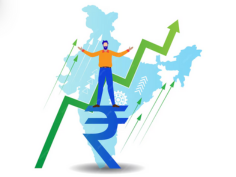The course on Indian Economic Development is meticulously designed to provide students with a comprehensive understanding of the economic policies, historical development, and current challenges of the Indian economy. The curriculum follows the CBSE guidelines and incorporates NCERT content, ensuring a robust, standardized education. This course aims to prepare students for advanced studies in economics and successful careers in economic policy and research.
What You'll Acquire:
- Economic Insight: Gain a solid understanding of key economic concepts, policies, and their impact on development.
- Analytical Skills: Develop critical analytical skills to evaluate economic conditions and policy implications.
- Historical Perspective: Understand the historical context of economic development in India since independence.
- Contemporary Challenges: Explore current economic issues and challenges facing India, including human capital formation and sustainable development.
- Comparative Analysis: Learn to compare India's economic development with that of its neighbors.
Who Can Learn: This course is ideal for:
- Recent Graduates: Students who have completed their 10th grade and are looking to specialize in economics.
- Aspiring Economists: Individuals aiming to build a career in economic research, policy-making, or academia.
Comprehensive Curriculum Featuring:
Unit I: Development Policies and Experience (1947–90)
Chapter 1: Indian Economy on the Eve of Independence This chapter explores the state of the Indian economy at the time of independence, including the socio-economic conditions, and the initial challenges faced by the newly independent nation.
Chapter 2: Indian Economy 1950-1990 This chapter outlines the economic policies and planning strategies implemented between 1950 and 1990, focusing on industrial development, land reforms, and the Green Revolution.
Chapter 3: Liberalisation, Privatisation and Globalisation: An Appraisal The focus here is on the economic reforms introduced in 1991, their rationale, implementation, and impact on the Indian economy, including the shift towards a market-oriented economy.
Unit III: Current Challenges Facing the Indian Economy
Chapter 4: Human Capital Formation in India This chapter discusses the importance of education and health in economic development, the current state of human capital in India, and the challenges and policies for improvement.
Chapter 5: Rural Development The chapter addresses the issues and policies related to rural development, including agricultural growth, rural infrastructure, and rural employment schemes.
Chapter 6: Employment: Growth, Informalisation and Other Issues This chapter examines the trends in employment growth, the challenges of informal employment, and the policies aimed at generating employment opportunities.
Chapter 7: Environment and Sustainable Development This chapter highlights the environmental challenges facing India, the concept of sustainable development, and the policies and measures needed to achieve it.
Unit IV: Development Experiences of India: A Comparison with Neighbours
Chapter 8: Comparative Development Experiences of India and Its Neighbours The chapter compares India's economic development with that of its neighbors, such as China and Pakistan, to understand different development trajectories and policy impacts.
Exclusive Resources and Materials:
- Interactive Lectures: Engage in dynamic video lectures to enhance your understanding of economic concepts.
- Subject-Specific Assignments: Develop analytical and critical thinking skills through tailored assignments.
- Multiple Choice Questions (MCQs): Reinforce your knowledge with a series of MCQs.
- Short Q&A Sessions: Participate in Q&A sessions to clarify doubts and deepen your understanding.
- Comprehensive Study Material: Access extensive study materials to support your learning journey.
Your Gateway to Economic Excellence: This course serves as your entry point into the world of economic development. It aims to equip you with the necessary skills and knowledge to excel in the field of economics. Join us on this educational journey to become an expert in Indian economic development.
Join Us in This Economic Journey: Thank you for considering the Indian Economic Development course. We look forward to embarking on this educational journey with you and helping you achieve your career aspirations in economics. See you in the course!






